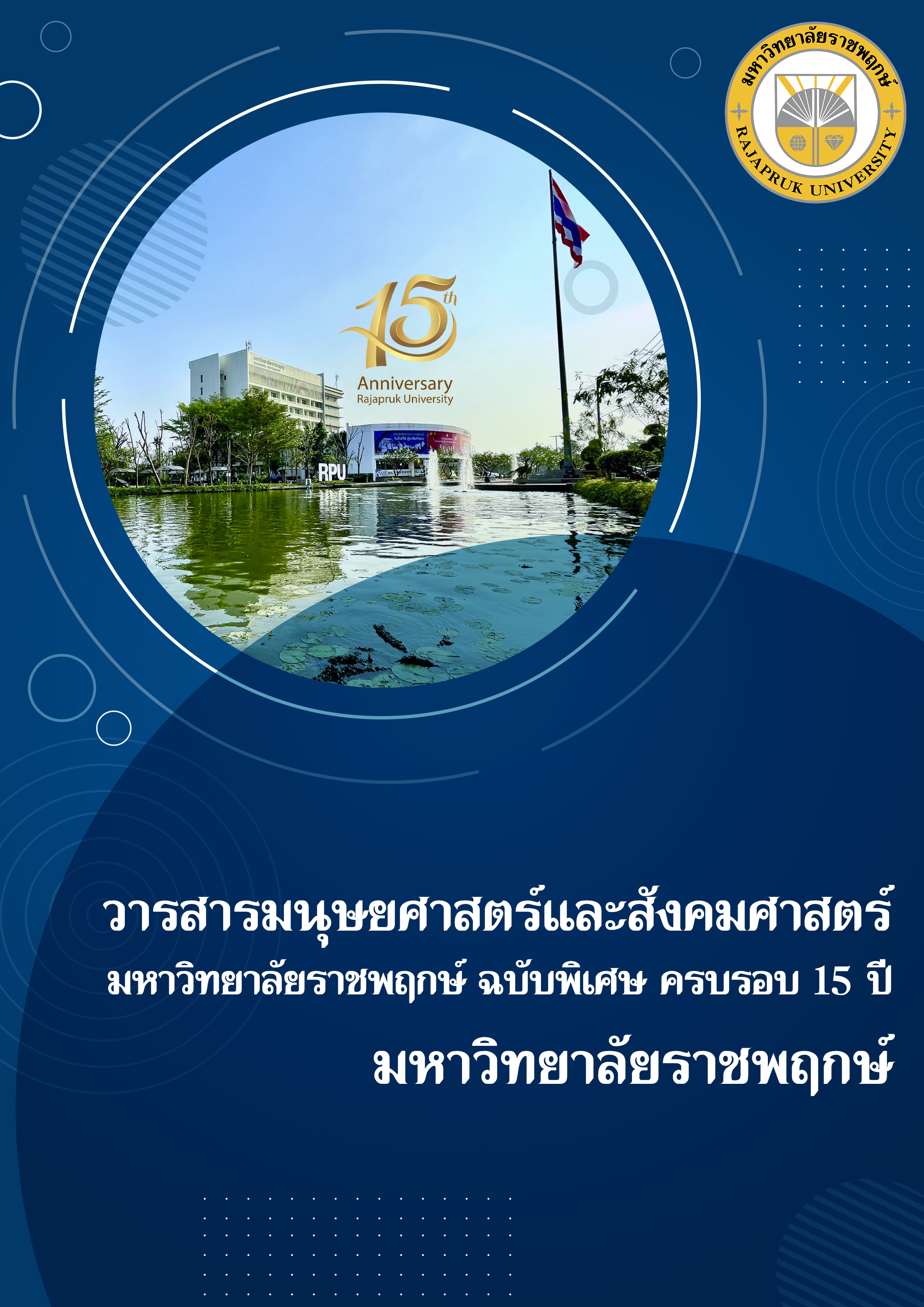Political Socialization Affecting Participation in Management of People within Samut Sakhon Municipality Area Mueang Samut Sakhon District, Samut Sakhon Province
Main Article Content
Abstract
The objectives of this research were 1) to study the level of peoples’ opinion which affected participation in management within Samut Sakhon municipality, Mueang Samut Sakhon district, Samut Sakhon province. 2) to study the relationship among political socialization factors and participation in management of people within Samut Sakhon municipality, Mueang Samut Sakhon district, Samut Sakhon province. This research employed quantitative research methodologies obtained by using questionnaire and selected sample size was 150 people within Samut Sakhon municipality, Mueang Samut Sakhon district, Samut Sakhon province. By using G*Power programs based on Cohen’s effect size, include non-probability sampling for data collecting data from accidental sampling. Consequently, the descriptive statistics for data analysis were used, percentage, mean, standard deviation and analyzed with Pearson correlation coefficient. These research results revealed that the level of participation in management in general was mostly. When considering each side it was found that participation in management to donate, to give material and to labor sacrifice was the highest. Relevantly, it found that all remainder of these factors were at high levels. Finally, the political socialization factors and the participation in management, in general, had positive relations, the low level. The Correlation Coefficient (r) was 0.478.
Article Details
References
ชวนะ ภวกานันท์. (2555). การจัดการมหาชนสร้างสรรค์สู่เศรษฐกิจสร้างสรรค์: ทักษะการคิดใหม่เพื่อการศึกษายุคประเทศไทยสร้างสรรค์. วารสารนวัตกรรมการบริหารและการจัดการมหาวิทยาลัยเทคโนโลยีราชมงคลรัตนโกสินทร์, 2(2): 1-20.
ถิรวัฒน์ แจ่มกระจ่าง และ ชลิต ศานติวรางคณา. (2557). ความสัมพันธ์ของการสื่อสารที่มีผลต่อการมีส่วนร่วมทางการเมืองของประชาชนในเขตเทศบาลนคร จังหวัดสมุทรปราการ. วารสารดุษฎีบัณฑิตทางสังคมศาสตร์, 4(1): 46-62.
บุศรา โพธิสุข. (2559). การมีส่วนร่วมทางการเมืองท้องถิ่นของประชาชน: ศึกษาเฉพาะกรณี ตำบลช้างเผือก อำเภอเมือง จังหวัดเชียงใหม่. พิฆเนศวร์สาร, 12(1): 151-164.
ประสพชัย พสุนนท์. (2553). สถิติธุรกิจ. กรุงเทพฯ: ศูนย์วิทยบริการ สถาบันเทคโนโลยีไทย-ญี่ปุ่น.
พงษ์เมธี ไชยศรีหา. (2561). แนวทางการพัฒนาวัฒนธรรมทางการเมืองประชาธิปไตยของประชาชนในเขตเทศบาลเมืองชุมแพ จังหวัดขอนแก่น. วารสารบัณฑิตศึกษามหาจุฬาขอนแก่น, 5(2): 243-262.
ยุทธ ไกยวรรณ์. (2553). หลักสถิติวิจัยและกรรใช้โปรแกรม SPSS. พิมพ์ครั้งที่ 2. กรุงเทพฯ: สำนักพิมพ์แห่งจุฬาลงกรณ์มหาวิทยาลัย.
วัลลภ รัฐฉัตรานนท์. (2557). การกล่อมเกลาทางการเมืองที่มีความสัมพันธ์กับทัศนคติทางการเมืองแบบประชาธิปไตยของนิสิตมหาวิทยาลัยเกษตรศาสตร์. รายงานการวิจัย ภาควิชารัฐศาสตร์และรัฐประศาสนศาสตร์ คณะสังคมศาสตร์ มหาวิทยาลัยเกษตรศาสตร์.
Bozeman, B. (2000). Technology Transfer and Public Policy: A Review of Research and Theory. Research Policy, 29(4): 627-655.
Carr, P. R., Sanchez S. Liliana Cuervo, & Daros M. Aparecida. (2020). Citizen Engagement in the Contemporary Era of Fake News: Hegemonic Distraction or Control of the Social Media Context? Postdigital Science and Education, 2(1): 39-60.
Cohen, J. (1988). Statistical Power Analysis for the Behavioral Sciences. 2nd ed. New Jersey: Lawrence Erlbaum Associates, Publishers.
Cohen, J. (1992). A Power Primer. Psychological Bulletin, 112(1): 155-159.
Helliwell, J. F., Huang, H., Grover, S. & Wang, S. (2014). Good Governance and Nation Well-Being: What Are the Linkages?. OECD Working Papers on Public Governance, 25. Retrieved from https://doi.org/10.1787/19934351.
Kudrnac, A. (2015). Theoretical Perspectives and Methodological Approaches in Political Socialization Research. Sociologia, 47(6): 605-624.
Memon, S., Ishak M. Sobhi, Hamid N. Abdul. (2018). Influence of Political Socialization Agents on Pakistani Youth’s Political Participation: The Mediating Role of Media and Interpersonal Communication. Journal Komunikasi: Malaysian Journal of Communication, 34(2): 121-136.
Neundorf, A., & Smets, K. (2017). Political Socialization and the Making of Citizens. Oxford Handbook Online, Oxford University Press. Online Publication Date: Feb 2017DOI: 10.1093/oxfordhb/9780199935307.013.98.
Pronchev, G. B., Monakhov, D. N., Proncheva, N. G., & Mikhailov, A. P. (2018). Contemporary Virtual Social Environments as a Factor of Social in Equality Emergence. Astra Salvensis, 6: 207-216.
Samsonova, T. N., & Titov, V. V. (2017). On National Civic Identity Formation of the Russian Youth in Global Socio-Cultural Transformations at the Beginning of the 21st Century. Moscow State University Bulletin Series 18 Sociology and Political Science, 23(3): 156-173.
Vasenina, I. V., Lipatova, M. E., & Pronchev, G. B. (2019). Particularities of Social and Political Activity of Russian Young People in Virtual Social Environments. Espacios, 40(35): 16-34.


